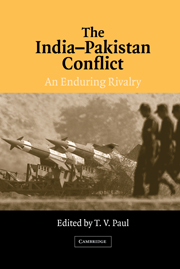Book contents
- Frontmatter
- Contents
- List of figures and tables
- Notes on contributors
- Acknowledgments
- Map: Jammu and Kashmir
- Part I Introduction
- Part II Theories of enduring rivalry and the South Asian conflict
- 2 Theoretical specifications of enduring rivalries: applications to the India–Pakistan case
- 3 The India–Pakistan conflict in light of general theories of war, rivalry, and deterrence
- 4 The India–Pakistan rivalry: prospects for war, prospects for peace
- 5 Realpolitik and learning in the India–Pakistan rivalry
- Part III Roots of the India–Pakistan conflict
- Part IV Conclusion
- Index
3 - The India–Pakistan conflict in light of general theories of war, rivalry, and deterrence
Published online by Cambridge University Press: 30 November 2009
- Frontmatter
- Contents
- List of figures and tables
- Notes on contributors
- Acknowledgments
- Map: Jammu and Kashmir
- Part I Introduction
- Part II Theories of enduring rivalry and the South Asian conflict
- 2 Theoretical specifications of enduring rivalries: applications to the India–Pakistan case
- 3 The India–Pakistan conflict in light of general theories of war, rivalry, and deterrence
- 4 The India–Pakistan rivalry: prospects for war, prospects for peace
- 5 Realpolitik and learning in the India–Pakistan rivalry
- Part III Roots of the India–Pakistan conflict
- Part IV Conclusion
- Index
Summary
Introduction
This chapter examines the India–Pakistan conflict in light of international relations theory. What can some of these theories tell us about the causes of the conflict, why the conflict goes to war, why it persists, and whether nuclear weapons will increase or decrease the probability of war? Two major theories will be the focus of the analysis: the steps to war explanation and classical deterrence theory, with an emphasis on the former. The chapter will begin with an overview of the steps to war explanation. It will then review some of the research on that explanation. Next, this explanation will be utilized to see how it can explain the India–Pakistan conflict and what new insights it might offer. Then, deterrence theory will be reviewed and criticized in light of the steps to war explanation. Lastly, the possibility of deterrence failure in the India–Pakistan conflict will be discussed.
The steps to war explanation: an overview
The steps to war explanation attempts to make sense of a welter of empirical findings on war by thinking about what these findings tell us about the foreign policy behavior between two or more states that makes them go to war. Since I have presented this explanation both in detailed and summary form, I will give only a brief overview here.
- Type
- Chapter
- Information
- The India-Pakistan ConflictAn Enduring Rivalry, pp. 54 - 79Publisher: Cambridge University PressPrint publication year: 2005
- 4
- Cited by



